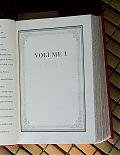
Leo Tolstoy
War and Peace, Volume One
On beginning War and Peace, it doesn’t take long to realize that its reading will be no mere reading: to read War and Peace is an experience. It rises up from the ground most novels cover to encapsulate such a wide expanse of action and characters, that when I surface I would find myself disappointed if I wasn’t living here. But its not only that action and these characters weaving in and around each other so masterfully, not only explosive war and snobbish sitting rooms of Russian high society, but that through all I’ve so far covered, I’m only beginning!
On beginning War and Peace, it also doesn’t take long to realize what a big history lesson I’m getting myself into. Because I was formally educated in the United States there are still tremendous blanks where the rest of the world is concerned. For instance, Napoleon three weeks ago was a vaguely powerful man; now, at least, I have some notion of the French and Allied dispositions at the Battle of Austerlitz, some context for the French Revolution, some idea of what a master-mind Napoleon really was.
Much of the first volume of War and Peace concerns itself with war. Two big battles and all the marching and camping and ranks and battle plans that goes along with them. Young Russian men march to stave Napoleon off from conquering the whole of Europe, young men willing to wield bayonets for an idealism. How young Nikolai Rostov seems, who for the first time finds himself a man in man’s company, his eager passion and desire to lay his life down for his sovereign.
He felt that it would take only one word from this man for that whole mass (and he himself bound up with it—an insignificant speck) to go through fire and water, to crime, to death, or to the greatest heroism, and therefore he could not but tremble and thrill at the sight of that approaching word.
Prince Andrei, on the other hand, comes off as slightly distant from his company, slightly more self-centered; in his deepest heart he wants glory through bravery and fighting, to be another Napoleon. Yet when he does meet Napoleon, through the pain of a near fatal wound, he is taken aback that Napoleon is like all others: a man. Because he had seen for the first time, the true character of the lofty sky.
“How quiet, calm and solemn, not at all like when I was running,” thought Prince Andrei, “not like when we were running, shouting and fighting…—it’s quite different the way the clouds creep across this lofty, infinite sky.”
I must suppose that some change will soon come over Prince Andrei, as he’s been left for dead—and change for everyone; war isn’t polite with psyches. Despite the strategies of an old theatre, there is not much about war that is different. Men fight all the same. They fight for idealisms and nationalities and sometimes they fight just to kill. As the earth has earthquakes, so we wouldn’t be content without our own upheavals: bloodshed has a necessity? It’s our human nature. Can we know peace without war?
It’s Tolstoy’s ability to get into these passionate emotions, perhaps some of the most passionate of the human spectrum, that makes this book so impressive for me. He carries me along through a foggy battlefield with cannons tossing down troops and horses; and when that “Hurrah!” rings out and the muskets fire I find myself dumbfounded at all that blood we have shed. Dead and wounded strewn across the fields like sheaves of wheat, across the concrete of Bangkok’s streets, Iraq, Afghanistan. All for a brief flicker of a lofty sky seen for the first time during the last breath…
(What insanity! Why not save all that trouble by simply looking up?)
Men go off and women stay at home. It’s Princess Marya, Prince Andrei’s sister, who interests me the most, whose unattractiveness Tolstoy never seems to tire of. She could be the perfect nun, yet when handsome Anatole comes around with proposals of marriage she’s quick to imagine herself surrounded by babies. Too bad her father’s too overbearing and she’s too ugly, with her intense ideas of God and purity and humility, I can’t help but wonder how she will fare.
With excited anticipation I look towards the bulk of pages, and how much more of this book that’s not a book, I will be drawn irresistibly into.
· · · · · · · · · · · · · · · · · · · ·